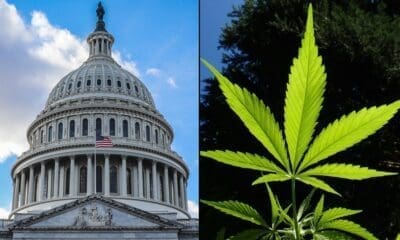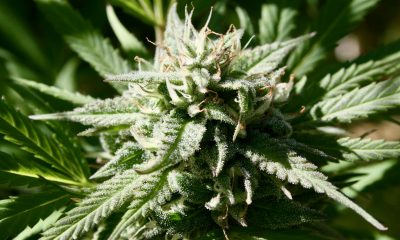Politics
Arizona Lawmakers Approve Psilocybin Research Grants As Part Of Budget

The Arizona Senate has approved budget legislation that includes provisions to fund research into the medical potential of psilocybin mushrooms for a variety of conditions.
Rather than enact the reform through a standalone psychedelics bill that was introduced earlier this session, top lawmakers and the governor agreed to incorporate the proposal into appropriations measures, albeit at a lower funding level compared to the original measure.
The Senate passed an appropriations bill that calls for $5 million in funding for psilocybin research on Wednesday. A related health-focused budget measure that also cleared the chamber details requirements for the clinical trials that those dollars will support. The House has given initial approval to companion versions of the legislation, with final passage expected soon.
The original standalone psilocybin bill that unanimously cleared the House Military Affairs & Public Safety Committee in February would have appropriated $30 million for the studies over the course of three years.
Under the approved budget legislation, the state Department of Health Services (DHS) would distribute $5 million for fiscal year 2023-2024 for “whole mushroom psilocybin phase one, phase two and phase three clinical trials that are capable of being approved” by the federal Food and Drug Administration (FDA) for the treatment for any of the 13 listed conditions.
Those conditions include post-traumatic stress disorder (PTSD), depression, anxiety, long COVID symptoms and substance misuse disorder, for example.
Researchers who use psilocybin with approval from the federal Drug Enforcement Administration (DEA) and whose trials involve veterans, first responders, health care workers and people from underserved communities would be prioritized for grant money.
The bill wouldn’t legalize psilocybin like lawmakers in several other states are aiming to accomplish, but people who receive the grant money and work on the clinical trials would be explicitly protected from prosecution under the bill.
A “Psilocybin Research Advisory Council” would be established under DHS, tasked with establishing eligibility criteria for grant recipients, overseeing applications and making “recommendations to the governor, the speaker of the House of Representatives, the president of the Senate and the department on psychedelic-assisted therapy based on current federal and state research policy.”
The bill says that the council would need to include the DHS director, a physician with a federal license to study psychedelics, a military veteran, a law enforcement official and a professor or researcher from an Arizona-based university.
—
Marijuana Moment is tracking more than 1,000 cannabis, psychedelics and drug policy bills in state legislatures and Congress this year. Patreon supporters pledging at least $25/month get access to our interactive maps, charts and hearing calendar so they don’t miss any developments.
![]()
Learn more about our marijuana bill tracker and become a supporter on Patreon to get access.
—
Numerous lawmakers in states across the U.S. have been pursuing psychedelics reform this session, particularly measures that focus on research and therapeutic use.
For example, the governor of Washington State has signed a bill on Tuesday to promote research into psilocybin and create a pilot program to provide therapeutic access to the psychedelic for mental health treatment.
Vermont lawmakers held a committee hearing last week where members discussed legislation to legalize psilocybin and take first steps toward providing regulated access to the psychedelic.
A California bill to legalize the possession of certain psychedelics and facilitated use of the substances is heading to the Senate floor under an accelerated process that is allowing it to skip further committee consideration.
The Minnesota House recently passed an omnibus health bill that contains provisions to create a psychedelics task force meant to prepare the state for possible legalization.
Last month, a Republican North Carolina lawmaker and a bipartisan group of cosponsors filed a bill to create a $5 million grant program to support research into the therapeutic potential of psilocybin and MDMA and to create a Breakthrough Therapies Research Advisory Board to oversee the effort.
A Nevada Senate committee approved a revised bill last month that would create a new working group to study psychedelics and develop a plan to allow regulated access for therapeutic purposes.
The Hawaii Senate approved a bill last month to create an advisory council to look into possible regulations to provide access to federal “breakthrough therapies” like psilocybin and MDMA.
Oregon regulators recently approved the nation’s first license for a psilocybin service center where people will be able to use the psychedelic in a supervised and facilitated environment.
Meanwhile, National Institute on Drug Abuse (NIDA) Director Nora Volkow told senators last week that there is emerging evidence that psychedelics carry “significant potential” as therapeutic treatments for certain mental health conditions, and it’s a topic of “great interest” for researchers.
An analysis published in an American Medical Association journal last year concluded that a majority of states will legalize psychedelics by 2037, based on statistical modeling of policy trends.
A national poll published in March found that a majority of U.S. voters support legal access to psychedelics therapy and back federally decriminalizing substances like psilocybin and MDMA.
















